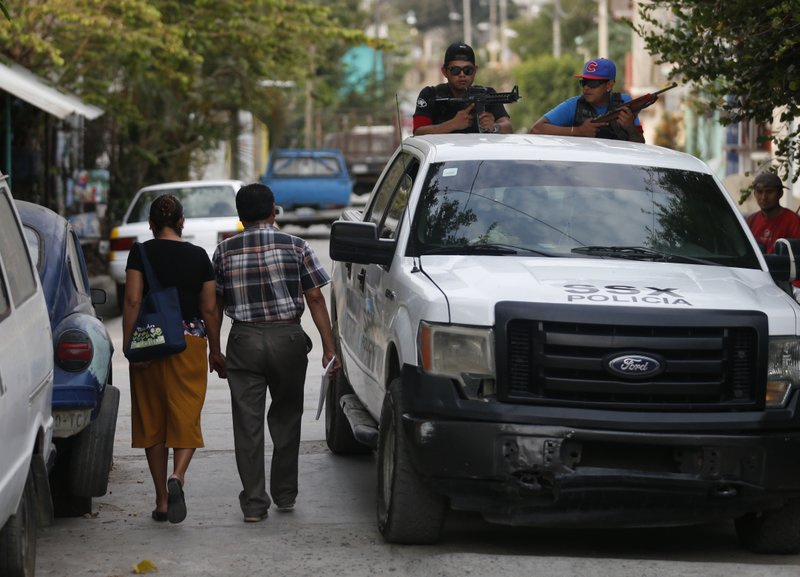What now passes for the law in Xaltianguis, a little town on the road to Acapulco, arrived with a car bomb and butchery.
A heavily armed vigilante force took over the town in the Mexican state of Guerrero last month by driving out a rival band, blowing up a car with gas cylinders and cutting up the body of one of two fallen foes.
Residents cowered in their homes or fled down the highway through mountainous tropical scrubland. Police and troops guarding Xaltianguis did nothing. Now, a few hundred yards (meters) from the new “community police” base the force set up, Mexican marines and state police guard the highway and make patrol sorties through the town. But they have made no attempt to arrest the vigilantes even though most openly carry illegal assault rifles.
“We have the town practically bullet-proofed by the government. At the entrances to the town you can see the army, the marines, all levels of government here supporting us,” boasted Daniel Adame, the leader of the group that took over Xaltianguis.
It is a scene repeated over and over again in southern Mexico: So-called “community police” or “self-defense” groups, often accused of drug cartel ties themselves, have proliferated and extended their control over territory. And time after time, outnumbered soldiers don’t intervene, in part because they are afraid of opening fire on civilians.
Many had expected violence to taper off in Guerrero as synthetic opioids like fentanyl knocked the bottom out of the opium market that had fed organized crime groups in the state. In fact, homicides in the notoriously violent state dropped by 36% in the first three months of the year. But it now appears a new round of violence is only starting, pitting warring gangs against vigilante squads fighting over fuel theft, gold mines and routes for precursor chemicals.
Thousands have been displaced by the fighting, and the toxic mix of cartels, hired killers, vigilante police forces have essentially neutralized the Mexican military, forcing troops into the role of mere spectators, or worse, hostages.
Adame is a far call from the vigilante leaders of past years, townsfolk who armed themselves with shotguns and single-shot rifles to defend their towns from drug cartels. Critics say rival gangs often infiltrated the ranks of “community police” forces. The leader of the FUPCEG vigilante group — the United Front of Guerrero Community Police — is a self-described businessman who owns a lion and exotic birds and has an expensive AR-15 with a telescopic sight. His son carries a pistol with carved silver handgrips.
He defended the use of the car-bomb, saying other vigilante groups like the rival UPOEG — the Union of Towns and Organizations of Guerrero — also use explosives. His group took over, he said, because the other group is tied to organized crime, an assertion UPOEG tosses back at his force.
Townspeople confirmed that FUPCEG took over the town in mid-May and ran rival vigilantes out, killing two and carving up the body of one man with bayonet-like knives.
Just across the state line in neighboring Michoacan, a group of vigilantes who state Gov. Silvano Aureoles described as “criminals, nothing more,” shoved a squad of a half dozen soldiers up against a wall, took their weapons, and pushed and insulted them until they agreed to return a .50 caliber snipers’ rifle that had been seized by a previous patrol.
Despite that humiliation, President Andrés Manuel López Obrador invited the soldiers to the National Palace a few days later to personally “thank them and reward their calm and grace under pressure, which avoided the death of innocent people,” according to the Defense Department.
That drew a howl of concern from the Mexican Employers’ Federation, one of the country’s leading business groups.
“The armed forces are the only viable force to restore order and peace,” the group said in a statement. “The president has ordered the army to protect the nation’s territory, and at the same time has asked them never to confront civilians…”
It complained the order “prevents them from confronting criminal gangs or paramilitary groups.”
And such groups are increasingly powerful and willing to challenge the armed forces.
Salvador Alanis is a strategist and spokesman for the FUPCEG, the group that took over Xaltianguis. He said the group has as many as 9,000 men under arms in a string of towns it controls, outnumbering the Mexican army in the state. Nor is Alanis loath to take on soldiers.
“One time the army came and fired tear gas at women, and we didn’t allow that,” Alanis recalled.
López Obrador is betting his security strategy on the newly created National Guard, a sort of militarized police force that is expected to be deployed in Guerrero in about a month. But if the Guard faces the limits the army faces, it will immediately be at a disadvantage in states like Guerrero and Michoacan.
“I’m telling the federal government right now, this could happen to your National Guard, because if one of these guys opens fire, it will be a massacre on both sides,” said Alanis, who claimed to have an arrangement with local army commanders in Guerrero to leave his forces alone.
“It’s a relationship of tolerance, if not coordination,” said Alanis. “You don’t mess with us, and we don’t mess with you.”
While most of the vigilante forces are recruited from local men, Alanis said his group also employs about 100 gunmen trained to kill for taking over towns. He calls them “a team that comes to destroy.”
“They are ready to kill or die for whatever you give them,” said Alanis.
And as the vigilantes grow harder to distinguish from cartels, the cartels also are growing bolder.
In the Michoacan town of Zamora, the Jalisco New Generation drug cartel paraded through town in May in a convoy of at least two dozen pickups and SUVs — all proudly bearing the cartel’s initials “CJNG” on their doors and sides.
With soldiers standing by as towns are taken over, the conflicts in some areas are becoming almost medieval. Residents of the town of Chichihualco have dug trenches across the highway leading to the FUPCEG stronghold in the village of Filo de Caballos because Alanis has repeatedly threatened to take over Chichihualco.
Others have set up roadblocks to defend their towns. Driving the back roads of Guerrero these days means passing dozens of roadblocks manned by men in civilian clothes with assault rifles.
“Comandante Geronimo” stood by one such bullet-riddled barricade made of sandbags. A member of the UPOEG, he has endured attacks about every two months from FUPCEG to the south and the Ardillos drug gang to the north. Geronimo — who won’t give his real name for fear of reprisals — explained why there is such heavy fighting for such small, poor towns.
“There’s a crisis now in the mountains and the criminal gangs aren’t blockheads,” he said. “They say this (opium) isn’t going to be a business, but the mines are. So I think a month of crisis is coming.”
The Canadian-owned gold mines that dot the mountains have historically been shaken down for protection payments by gangs. Now gold has been discovered at other spots in the state, raising the prospect that cartels or vigilante groups may want to take a direct role in the mines.
Others believe the groups want to take control of routes to the seaport of Acapulco to move precursor chemicals now that synthetic opioids have displaced the region’s natural-grown opium poppies.
“We thought that once the opium poppy business died out, the violence was going to end,” said David Barragan, a resident of Los Moros who was forced from his village by the incursion of Alanis’ FUPCEG forces.
Like many residents of the mountains, Barragan long depended on planting an acre or two of poppies to bring in cash. But when prices dropped a couple of years ago, Barragan turned to his stand of avocado trees, the new “green gold” in the mountains of southern Mexico.
But now the vigilantes have seized his avocado orchard and are harvesting the fruit he has waited for two years to mature.
Barragan, like hundreds of his neighbors — and thousands throughout the state — has fled. He says people won’t take it much longer.
“The National Guard is what we most need up here, and have been waiting for, but if it doesn’t work, we are going to take other measures,” Barragan said, adding a lot of his neighbors are thinking of getting guns.
What now passes for the law in Xaltianguis, a little town on the road to Acapulco, arrived with a car bomb and butchery.
A heavily . . .












